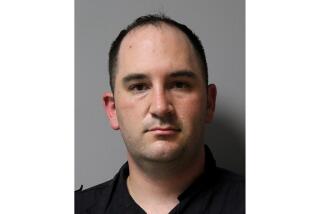Trial date set in Ft. Hood rampage
- Share via
Reporting from Ft. Hood, Texas — A U.S. military judge set a March 2012 court-martial date for an Army psychiatrist charged in the deadly 2009 shooting rampage at a Texas military base.
At an arraignment Wednesday that lasted about 15 minutes, Maj. Nidal Malik Hasan declined to enter a plea before Ft. Hood Chief Circuit Judge Col. Gregory Gross. Gross granted a request by Hasan’s lawyers to defer the plea to a later date.
Gross set March 5, 2012, as the start of Hasan’s court-martial. He could face the death penalty if unanimously convicted by a 12-member jury of U.S. soldiers.
Hasan, 40, is charged in the Ft. Hood shootings that killed 13 people and wounded 32 others on Nov. 5, 2009.
On Wednesday, Hasan appeared in the base’s small courtroom in Army fatigues and with a shaved head, and was in a wheelchair after being paralyzed from the chest down by bullet wounds inflicted by civilian police officers during the shooting.
According to witnesses who testified at evidentiary hearings at Ft. Hood last year, Hasan shouted “Allahu akbar” — Arabic for “God is great” — before opening fire on a group of soldiers undergoing health checks in preparation for deployment to war zones in Iraq and Afghanistan.
If convicted and given the death penalty, Hasan would be the first American soldier to be executed in a U.S. military proceeding in more than 50 years.
Hasan would have the right to appeal any verdict to several military and civilian courts, including the U.S. Supreme Court, a process that could take years, military justice experts said.
“Maj. Hasan stands a very good chance of being executed,” said Eugene R. Fidell, who teaches military justice at Yale Law School. “The government won’t have any difficulty in making him the trigger man.”
The U.S. president would have to personally approve any execution before it was carried out.
The Ft. Hood incident raised concerns over the threat of homegrown militant attacks. U.S. officials said Hasan had exchanged emails with Anwar Awlaki, an anti-American Al Qaeda figure based in Yemen.
More to Read
Sign up for Essential California
The most important California stories and recommendations in your inbox every morning.
You may occasionally receive promotional content from the Los Angeles Times.









